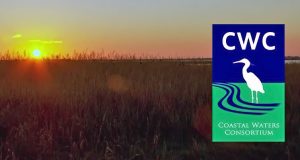Video: Deciphering Oil Spill Impacts in Louisiana Wetlands
– January 8, 2015
 No one can change history, but we can learn from it. That’s what CWC scientists are doing as they study the heavily-oiled Louisiana coastal marshes affected by the Deepwater Horizon spill.
No one can change history, but we can learn from it. That’s what CWC scientists are doing as they study the heavily-oiled Louisiana coastal marshes affected by the Deepwater Horizon spill.
They are examining all levels of the marsh food web, from marine plankton to birds of prey. Their goals are to understand oil impacts and contribute knowledge for decision-making that leads to less environmentally intrusive human activities.
The CWC and WBRZ productions developed a video that describes their GoMRI-funded research on the chemical evolution, biological degradation, and environmental stresses on Louisiana wetlands.
Credit: WBRZ Productions and Steve Burns
Read recent highlights of marsh-related studies: Study Reveals Mix of Resilience and Vulnerability of Oiled Marsh Grass, Study Estimates Decades-Long Persistence of Harmful Hydrocarbons in Marshes, and Study Reveals Recovery and Loss in Oiled Louisiana Marshes. For a list of recent CWC peer-reviewed publications resulting from their GoMRI-funded research, click here.
Read a description about CWC research activities: By Land and Not by Sea: Creeping, Crawling Critters in Marshes Help Track Oil Impact.
Read how CWC researchers share science with the local community: Louisiana Educators Shadow Scientists in Reality Wetlands Workshops and CWC Involves All in the Family in Oil Spill Marsh Science.
Visit the CWC website to learn more about their work.
Photographer P.J. Hahn, who contributed imagery to the CWC video, has also had his work featured in National Geographic.
************
This research was made possible in part by a grant from BP/The Gulf of Mexico Research Initiative (GoMRI) to the Coastal Waters Consortium (CWC).
The GoMRI is a 10-year independent research program established to study the effect, and the potential associated impact, of hydrocarbon releases on the environment and public health, as well as to develop improved spill mitigation, oil detection, characterization and remediation technologies. An independent and academic 20-member Research Board makes the funding and research direction decisions to ensure the intellectual quality, effectiveness and academic independence of the GoMRI research. All research data, findings and publications will be made publicly available. The program was established through a $500 million financial commitment from BP. For more information, visit https://gulfresearchinitiative.org/.
© Copyright 2010- 2017 Gulf of Mexico Research Initiative (GoMRI) – All Rights Reserved. Redistribution is encouraged with acknowledgement to the Gulf of Mexico Research Initiative (GoMRI). Please credit images and/or videos as done in each article. Questions? Contact web-content editor Nilde “Maggie” Dannreuther, Northern Gulf Institute, Mississippi State University (maggied@ngi.msstate.edu).





